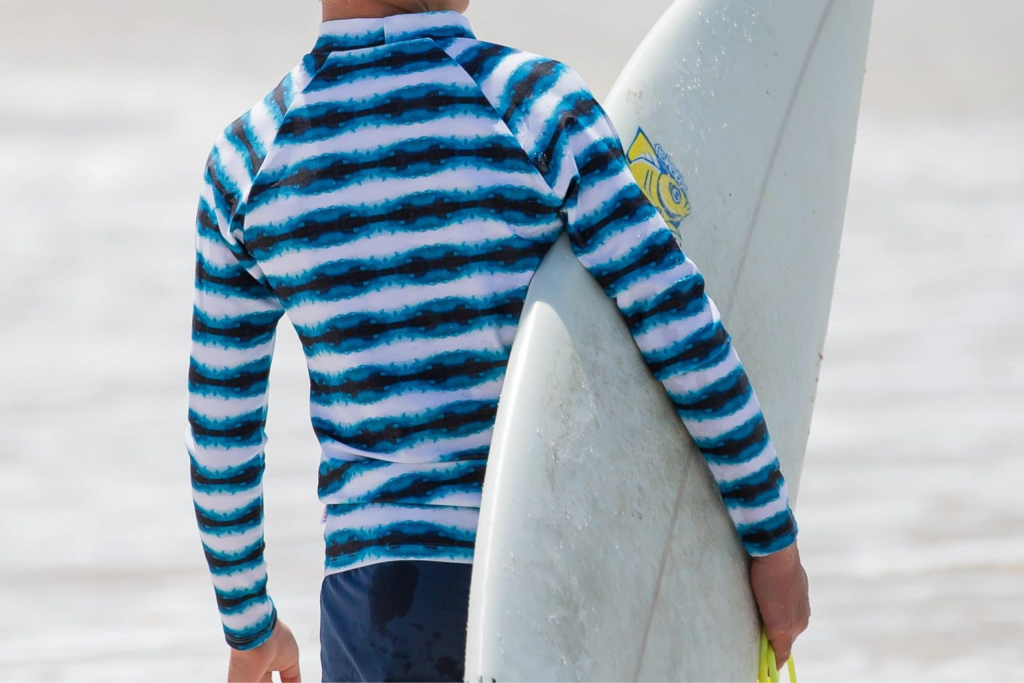Table of contents
Summer is a time for having fun in the sun, and one of the most popular summer activities is swimming. Swimming is a great way to stay active, cool off, and have fun at the beach, pool, or lake. Swimming, while a fun and healthy activity, does pose some risks, particularly when it comes to sun exposure. Sun protection is essential for anyone who spends time in the water, as prolonged exposure to UV rays from the sun can cause serious health issues, including skin cancer. In this blog post, we’ll look at why it’s important to wear sunscreen while swimming and how to stay safe in the sun.
The Risks of Sun Exposure
The sun emits ultraviolet (UV) radiation, which is a type of energy that cannot be seen with the naked eye. UV radiation is divided into three types: UVA, UVB, and UVC. UVC radiation, the most perilous type, gets absorbed by the ozone layer, preventing its reach to the Earth’s surface. UVA and UVB rays, on the other hand, can harm the skin, eyes, and immune system.
When you spend prolonged amounts of time in the sun, your skin gets exposed to UV radiation. The skin then reacts by producing melanin, which is a pigment that gives skin its colour. Melanin is a pigment that absorbs UV radiation and protects the skin from damage. When the skin is overly exposed to UV radiation, it cannot produce enough melanin to protect itself, and damage can occur.
The most obvious consequence of sun exposure is sunburn. Sunburn is an inflammatory response caused by UV radiation damage to the skin. UV radiation damage to the skin causes an inflammatory response known as sunburn. Sunburn can cause redness, pain, and blistering, as well as increase the risk of developing skin cancer. Aside from sunburn, prolonged exposure to UV rays from the sun can cause premature ageing, wrinkles, and other skin damage. It can also increase the risk of skin cancer, the most common type of cancer in the United States.
The Importance of Sun Protection
Sun protection is vital for anyone who spends time in the sun, particularly when swimming. When you’re in the water, you’re more vulnerable to sunburn and skin damage because water reflects and intensifies the sun’s rays. Furthermore, it’s easy to lose track of time while having fun in the water, so you can’t always keep track of how long you’ve been exposed to the sun.
There are several steps you can take to protect your skin from the sun’s harmful UV rays while swimming. Wearing sunscreen is the first and most important step. A sunscreen can be bought as a lotion, cream or spray and is applied directly to your skin to absorb or reflect UV rays. Sunscreens are classified according to their SPF, or sun protection factor, which indicates how much protection they provide. The higher the SPF, the greater the protection provided by the sunscreen.
When choosing, it helps to look for one that says “broad spectrum.” This is because broad-spectrum sunscreens protect against both UVA and UVB radiation. It’s also critical to choose a water-resistant sunscreen, as regular sunscreen can wash off in water.
Swimming requires the use of protective clothing in addition to sunscreen. A wide-brimmed hat, a rash guard or swimsuit, and sunglasses are all recommended. These items can help protect your face, neck, and eyes from harmful UV rays from the sun.
Staying Safe in the Sun
In addition to wearing sunscreen and protective clothing, there are several other precautions you can take while swimming in the sun. These are some examples.
- Limit your time in the sun: Try to limit your time in the sun during peak hours, which are typically between 10 a.m. and 4p.m. Plan your swimming activities for the early morning or late afternoon.
- When you are not in the water, seek shade. This could be under an umbrella, a tree, or a covered area. This can help you avoid being exposed to the sun’s harmful UV rays.
- Hydration. Drink plenty of water. By staying hydrated, you can help keep your body cool, lowering the risk of heat exhaustion or heat stroke.
- Keep an eye on your skin: Monitor your skin for changes, such as spots or new moles, and report them to your doctor. Skin cancer can be treated more successfully if it is detected early.
- Educate your children. Because children are especially vulnerable to sun damage, it is critical to teach them the value of sun protection. Encourage them to wear sunscreen daily and protective clothing when they are not in the water and to seek shade when they are.
- UV Swimwear: Wearing UV swimwear and UV hats will protect you from the sun’s rays even when in the water.

Heading for Under-The-Sun Activities?
Wear protective swimwear: Wearing protective clothing can help block the sun’s harmful UV rays and lower your risk of sunburn. Look for swimwear with at least a UPF (Ultraviolet Protection Factor) of 50, which can block up to 98% of UV radiation.
Using a wide-brimmed hat: While swimming, a wide-brimmed hat is essential. It provides additional shade for your face, shoulders, and neck. Search for hats with at least a 3-inch-wide brim.
Wear sunglasses: By wearing sunglasses with UV protection, your eyes can be protected from sun damage, which can cause cataracts and other eye issues.
Reapply sunscreen: You should ideally apply sunscreen every two hours, or more frequently if you’re swimming or perspiring. Use enough sunscreen to completely cover all exposed skin, and also remember to cover the tops of your feet, ears, and nose.
UV-blocking swimwear: Certain swimsuit manufacturers now provide UV-blocking textiles that can offer further protection against the sun’s harmful rays. Those with fair skin and children can benefit most from these fabrics.
Know your skin type: Individuals with pale skin, freckles, or a history of sunburn should take extra precautions when swimming in the sun because they are more likely to get skin cancer. To find out your skin type and any further precautions you can take to protect your skin, speak with your doctor or dermatologist.
While swimming, you may help lower your chance of skin damage and sunburn by observing these sun protection measures. Remember that keeping your skin protected from the sun is important for your health and wellbeing, in addition to preventing sunburn.

Shop UV Sun Hats and Swimwear
Key Takeaway
For anyone who spends time in the water, whether it be at a lake, pool, or beach, it is vital that they wear sunscreen. Skin cancer is one of the serious health issues that can result from prolonged exposure to the sun’s harmful UV rays. Use sunscreen, wear protective clothes, seek out shade, don’t spend excessive time in the sun, stay hydrated, and keep an eye on your skin to stay safe while swimming in the sun. You can profit from swimming while safeguarding your health and wellbeing by following these tips.






